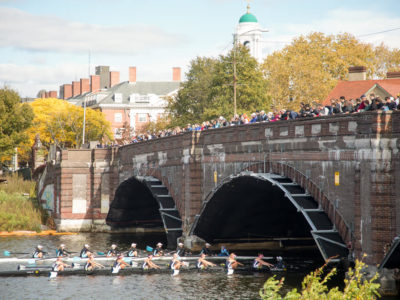Anyone attending a university with D1 athletics knows the term “NARP” (Non-Athletic Regular Person). People say it jokingly with their friends, causing the term to gain traction over the last few years. This slang term refers to a student who doesn’t participate in intercollegiate athletics.
Of course, this definition applies to the majority of students pursuing higher education. Therefore, many students are comfortable using the label, “NARP,” lightly, despite its negative connotation. For them, it’s just a jab at their buddies as they scarf down mozzarella sticks and laugh at taking trips to the gym. However, for other students, the term does more than indicate an individual’s lack of participation in higher-level athletic competition. It signifies an exclusion from the athletic world, and each time it is used, the impact leaves a hidden bruise.
Contemplating why this word affects people so much, I considered my own athletic career. I was an average rower throughout high school, despite being fiercely competitive. I wanted to be fast—fast enough to be recruited. In my mind, signing a letter of intent signified the ultimate acceptance from a D1 coach. So that became my goal.
I would run after practice and lift weights to gain muscle mass. I wanted it more than anything. My coaches told me I would never be good enough, but I continued to work to prove them wrong. I improved a little, but realized it was not enough when I met with the head coach from a dream-worthy Ivy League school.
“Aren’t you a little small to be a rower?” she asked with narrow eyes, obviously sizing me up.
“Well, yes, but…” I squeaked out an excuse for why my size didn’t matter.
She didn’t buy it.
Thus, when choosing my university, I desired an institution that would allow me the opportunity to row. Boston College was that university where I would be able to prove myself to the coaches, so I submitted my deposit.
The try-out days inched by, driving me into an impatient frenzy. I poured every ounce of my energy into those practices, doing all that I could to prove myself. In the end, I made the team, and the pure joy I felt while reading my name on the roster was unfamiliar. I felt accomplished because I had earned that spot—I had earned that approval.
In retrospect, my freshman year of college seemed to replicate my high school experience. I struggled to prove myself, squeezing in extra workouts and doing everything I could to improve. I neglected the friendship-building processes that other freshmen valued so much. At the end of the year, I significantly improved my times, and it gave me hope that I could come back in the fall and impress everyone with my improvement.
However, this was not the case. That summer, I pushed my body a little too far. I pulled my hamstring while deadlifting too much weight. I arrived in the fall with a physical therapy prescription. My doctor advised against rowing, but I insisted on continuing training in a few weeks. Hesitant, the coach allowed me this grace period to try out, but reminded me that I still needed to hit my standard time before a specified date. Unable to row for months, I could only cross train, but I held out hope.
I grew frustrated in the following weeks, praying to recover more quickly. Rowing and academics were all I ever knew. Without seeing my teammates at practice everyday, I became lonely. Clinging to my shriveling dream, I worked out in the gym alone. I tried getting back on a rowing machine, but once I applied pressure, pain would streak down my leg.
I sulked around, burdened with the knowledge that I could not row a single stroke by my deadline—let alone hit my standard. One night, I lay on a friend’s bedroom floor, staring at the ceiling, contemplating my options for hours.
The very next day, I quit.
I expected to feel miserable, but I wasn’t. I began writing for the student newspaper, joined campus ministry and started taking time to nourish some friendships. More than anything, I missed competing. Convinced that I still had some athletic potential living within me, I started running once I recovered. Sure enough, after tasting the endorphins of a long run, I was hooked. Since then, I’ve run two marathons, even qualifying for Boston. After that race I cried uncontrollably, finally feeling those years of work had paid off.
Marathons do something new for me. I run alone, and during the race, I know I am not trying to prove anything to coaches. I run for personal satisfaction.
So, yes, I’m a NARP now. I no longer carry the Division I athlete title or the approval it incites. However, I have had the unique opportunity to experience campus life with and without it. I realized that no one is “lesser” for being a so-called regular person.
Beyond that, there is nothing wrong with walking away from something that is doing more harm than good in your life. I was always warned against quitting, so when I left the team, every cell in my body rejected the decision. But I did it anyway. Today, I no longer row 2k’s, I run 42k’s, and I do it for myself.



















